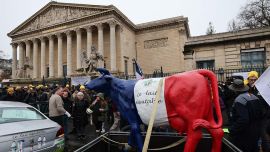Argentina is seeking to make its decades-old rules governing patented seed technology fit for the modern era, a move that would allow it to compete with agriculture powerhouse rivals Brazil and the United States.
As part of new President Javier Milei’s sweeping reforms to liberalise the economy, seed companies including Syngenta Group Co Ltd, Corteva Inc and Bayer AG would be able to charge farmers royalties. That would bring investments to Argentina and give the nation access to the latest genetically modified seeds.
An arcane law dating to the 1970s protects farmers from having to pay annual fees to seed companies. As a result, they have been left behind while neighbouring Brazil has produced record crops year after year. Without the newest strains, Argentine soybean yields are about 17 percent lower than in Brazil and the US, according to analysts at the Rosario Board of Trade.
Changing the rules would be “a huge step,” said Pablo Vaquero, a distributor of cotton seeds. “We’ve been falling behind Brazil and the US for years and now they wipe the floor with us.”
Argentina usually is the largest exporter of soy meal and soy oil, the third-biggest exporter of corn and a top global wheat supplier. But its agriculture industry has been in steady decline as governments heavily taxed farmers and meddled with exports. Most farmers voted for libertarian Milei in a bid to reverse the predicament.
The president’s package includes signing Argentina on to the latest global convention — from 1991 — protecting more comprehensively the intellectual property rights of seed breeders. It is set to face resistance in congress, where Milei’s party is a minority.
While the current state of affairs would seem to save farmers money, it’s effectively placed the Pampas crop belt in a time warp where they plant outdated strains that yield less than their rivals abroad.
At a soy conference in September, Juan Jose Blanchard, head of Latin America at Louis Dreyfus Co, underscored how the seed technology problem has contributed to the crop industry’s decline.
“Do you know how many serious programmes there are today in Argentina for improving soy genetics?” said Blanchard, an Argentine. “One, two, three maximum. In Brazil there’s a minimum of 30. So if we stay where we are, the gap between Argentina and Brazil in farm productivity is going to get wider and wider.”
If the package goes through, implementation of the seed rules would be at the discretion of local lawmakers and policymakers, said Rodolfo Rossi, a former seed scientist who heads soy association Acsoja.
Previous governments tried and failed to charge farmers for seeds reaped from one harvest and used to plant the next.
For a few years from 2016, Argentina even allowed Monsanto Co — later acquired by Bayer — to test soy cargoes for its Intacta technology and try to collect royalties. In 2021, Bayer exited the Argentine soy seed business, citing global strategy changes and a redirecting of investments in the country to “profitable” projects.
by Jonathan Gilbert, Bloomberg




















Comments